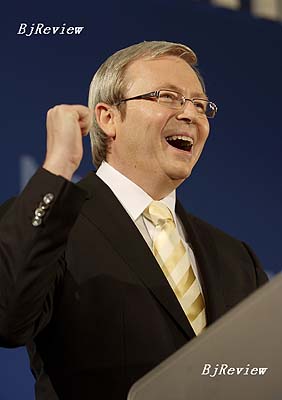|

Australia's prime minister-elect Kevin Rudd has caught the attention of the Chinese with his modest appearance, fluent Mandarin and personal bonds with China.
Rudd, 50, graduated from the Australian National University in Canberra, where he majored in Chinese language and history. He is the first Mandarin-speaking leader from an English-speaking country and is known in China by the elegant name Lu Kewen. As a diplomat, he worked in the Australian Embassy in Beijing in the 1980s.
"If I become Australia's prime minister, I believe our bilateral relations will be raised to a new height," Rudd said in Chinese in an interview with China Central Television (CCTV) before the November 24 elections. "The relations are now very good, and they will be even better in the future."
While introducing many changes to Australia's domestic and foreign policies, the new Australian leader will continue to attach great importance to his country's relations with China, foreign affairs experts said.
‘Old China hand'
Rudd will be Australia's 26th prime minister and will succeed John Howard, who has been in office for the past 11 and a half years. Rudd claimed victory for the Australian Labor Party, the country's oldest and biggest political party, when it gained a majority of 76 seats in the House of Representatives, or the lower house. In this year's federal elections, about 13.6 million voters chose from 1,421 candidates for all the 150 seats in the House of Representatives and 40 seats in the 76-member Senate. Under Australia's voting system, the political party that has the most members in the House of Representatives becomes the governing party. Its leader becomes prime minister, and other ministers are appointed from the party's members in the House of Representatives and Senate.
China-Australia relations have enjoyed a sound development since the two countries established diplomatic relations in 1972, said Sun Huiming, a South Pacific studies expert at the China Institutes of Contemporary International Relations. As a major resource producer, Australia has much to offer China, which needs more and more energy and resources to fuel its rapid development. For its part, China offers Australia labor-intensive products, such as textiles, which the large, scarcely populated country needs. The flourishing trade relations have benefited both countries, and that's why both Howard's Liberal-National Party coalition and Rudd's Labor Party value Australia's relations with China, Sun said.
"We have good economic complementarities and great new areas for cooperation in the future--financial services, clean energy, biotechnology and education," Rudd told CCTV. "I believe, therefore, we can extend prosperity to our both countries."
The Asia-Pacific region will be the center of economic activity in the 21st century, and China will be a core part of that together with other regional economies, Rudd said. Australia is looking forward to partnering with China in the future to extend free trade across the Asia-Pacific, he added.
With his good command of the Chinese language, Rudd is able to have a deeper, wiser understanding of China, said Wang Zhenyu, an assistant research fellow at the China National Committee for Pacific Economic Cooperation. However, as Australia's prime minister, Rudd will have to put his country's interests first when dealing with China, he added.
China-Australia relations will be further strengthened under Rudd's premiership but will not be problem-free, Wang said. A number of issues are on Wang's list of concerns. For example, as the Labor Party underlines multilateral trade, the ongoing negotiations on the China-Australia free trade agreement will face greater uncertainties, he said. China's human rights record is likely to become another point of contention in bilateral relations. The Labor government may also exert heavy pressure on China's environmental protection activities.
China and Australia decided to put in place an annual strategic dialogue during Chinese President Hu Jintao's visit to Australia in September. This should let the two countries strengthen their communication to avoid fluctuations in bilateral relations, Wang said.
New policies
In his acceptance speech, Rudd pledged to begin work immediately on implementing Labor's election promises on education, climate change, workplaces laws and hospitals. Education and health care have been Rudd's two major "selling points," areas where he had long been ahead of Howard in public opinion polls, Wang said.
On the diplomatic front, Rudd said he was looking forward to "a working partnership" with Australia's ally, the United States, and its partners across Asia and the Pacific and in Europe. Australia's relations with the United States will continue to top the country's foreign relations agenda, Wang said. Although Rudd wants a staged withdrawal of Australian combat troops from Iraq, he will duly address U.S. concerns in the process, he added.
Under Rudd, Australia will forge closer relations with countries in the Asia-Pacific region, especially China, Wang said. The new government will carry out security cooperation with Japan without building an alliance with the country as Howard's administration did. It will strengthen Australia's relations with India, but will not sell nuclear materials to it. It also will increase aid to developing countries, a policy that may help mend Australia's strained ties with South Pacific island countries.
Australia is expected to sign the Kyoto Protocol soon, making the United States the only developed country outside the United Nations global-warming pact. The move will enable Australia to polish its international image and better cash in on its sophisticated clean energy and emissions reduction technologies, Wang said. | 